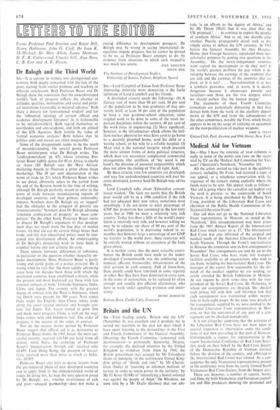SIR, —Lord Campbell of Eskan finds Professor Bauer depressing. Infinitely more
depressing is the facile optimism of Lord Campbell and his friends.
A developed country needs the following : (1) A literacy rate of more than 90 per cent, 10 per cent of the population to be true graduates of true uni- versity level, at least 30 per cent of the population to have a true grammar-school education; some original work to be done in some of the more im- portant disciplines within the country, 40 per cent of the work force in engineering. (2) More significant, however, is the infrastructure which allows the bril- liant nuclear physicist (or what have you) to go home to a decently plumbed house, send his child to a worthy school, or his wife to a reliable hospital. (3) Most vital is the national integrity which prevents the more sinister forms of dotty political structure, which does not necessitate complicated commercial arrangements (the antithesis of 'my word is my bond'), the doctrine of personal responsibility which does not allow the feeling of 'I'm all right, Jack.'
By these criteria, very few countries are developed, and very few underdeveloped countries will ever be- come developed, however hard Dr Balogh may advise them.
Lord Campbell talks about 'Edwardian conven- tional wisdom.' The facts are surely that the British poor would still be in a 1906 condition if the rich had not educated their new rulers, sometimes most unwillingly. I do not know to what percentage of GNP this proportion has amounted in the last sixty years, but in 1906 we were a relatively very rich country. Today less than a fifth of the world's popu- lation is relatively very rich, and however willing we may be to educate our share of 80 per cent of the world's population, it is depressing indeed to re- member that however large a percentage of our GNP we transfer to the world poor, these resources will be entirely wasted without an awareness of the facts given above.
It is further ironic that the most valuable contri- bution the British could have made to the under- developed Commonwealth was the continuing eco- nomical, efficient, trustworthy, infrastructure of the civil services in each country. •Full of know-how, these people could have remained in some capacity or other. But they have been dismissed in every case, in the name of nationalism, to be replaced by often corrupt and usually less efficient alternatives, who have to work under appalling pressures and uncer- tainty.
HENRY HOBHOUSE
Bottom Barn, Castle Cary, Somerset














































 Previous page
Previous page